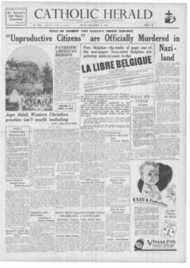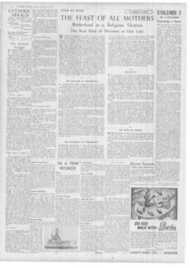Page 5, 19th December 1941
Page 5

Report an error
Noticed an error on this page?If you've noticed an error in this article please click here to report it.
Tags
Share
Related articles
Irish %pta's Leifer
When Will The Jap War End?
Partition Alleged To Impair Efficiency
Protestant Unionists Expose The Tyranny And...
Eire Wishes (without Hope) For Speedy Armistice
Jap War Affects Eire
Supplies Are Shorter, Especially Petrol
From Our Own Correspondent
DUBLIN.
The spread of the war to the Pacific, and Japan's entry, have no direct bearing on Irish neutrality, of course, but Ireland is interested personally and intimately in a hundred thousand homes. What Irish family has not members in the United States? Everywhere, therefore, American' belligerency affects Irish folk.
How far will supplies be affected? In a debate in the Senate on the extreme shortage of petrol, speakers said that a complete stoppage was a likelihood of the coming months. Trains are now so few that posts are restricted, but the request of Cork merchants for the auxiliary carriage of mails by road has been refused, of necessity.
Thus, step by step, we move back towards the pre-motor, and even the prerailway, age. In 1942, Ireland will be mttch like Ireland of 1842.
" EVERY REASON FOR WORRY."
Every Tuesday, a Defence programme is broadcast from Athlone, to encourage recruiting and to stimulate the moral of the Defence forces. Usually a Minister speaks before the musical portion.
Mr. Frank Aiken, Minister Co-ordinating Defence, spoke in grave terms last Tuesday. " There is every reason why we should be concerned and very worried about the future," he said. " But we must not allow our danger to drive us into any kind of fatalism.
" Our one chance of safety, and it is a fair chance in my opinion," said Mr. Aiken, " is to continue facing the danger like men. Our one chance is to be prepared to do our duty—to defend the rights of this portion of our nation to the utmost of our power.
" Being people of ordinary common sense, we know that peaceful intent is no guarantee of peace. Our will to peace must be as resolute as a potential aggressor's will to war. If our resolution continues unshaken, and with the help of God it will, we have a good chance of being left in peace.
" Convenient as this portion of our country might be to a belligerent if obtained with the goodwill of our people, there is no strategic advantage to be obtained through possessing it which would go near compensating for the cost of conquering it by force against the will of our united people and the determined resistance of our Defence Forces."
NOTICE TO QUIT
The most bigoted Orange constituency in Belfast has astonished all by returning Mr. Harry Midgley, Socialist, by a two to one majority against the Official Unionist candidate. This is the second bye-election held in a year in the Six Counties. The last was in North Down, when the Official Unionist was defeated in Viscount Craigavon's vacated scat.
The constituency won by the Belfast Labour leader, Willowfield, is that in which the erection of a Catholic church was resisted a couple of years ago with violent and blasphemous demonstrations,
When Mr. Midgley announced his intentkm to contest the seat at the by-election, his Challenge was regarded as a gesture, and his chances of election as remote. He has won the most sweeping victor ever won in Six County politics.
Universally, the result is hailed as a " notice to quit " to the Administration. It must not be thought, however, that the result is a verdict against Partition. The Catholic Irish News of Belfast well says that it is a comment, not on the Partition issue, but on the Partition results. Mr. Midgley is not fond of partition, but he pledged himself not to raise the issue.
Mr. Midgley himself lost the sympathy of the Catholic public at the time of the Spanish war, when he championed the Red cause enthusiastically. It is curious how extremes meet in this matter. On the very day when Mr. Midgley was at the polls. some residents in Northern Ireland received a circular letter from a committee in London collecting money for Spaniards. The letter was signed by the Duchess of Athol!, who assured her readers that the present war is a Continuation of the struggle in Spain, i.e., by the Red forces. This is a strange way to recommend the British cause to a Christian people. Does the Ministry of Information approve of her Grace's identification of Britain with Red revolution?
SO THIS IS DUBLIN At an inquiry in Dublin, the state of the slums, after twenty years of unremitting effort to cleanse those Augean stables, was illustrated in the state of two tenement houses in the region known as the Gloucester Diamond. In one of these houses seven families, numbering 28 persons, occupy nine rooms; in the other, tcn families, consisting of 44 persons, occupy eleven rooms.
The M.O.H. told also of a third dwelling in which a father and a mother, with four adult children, lived in a top back-room without fireplace or flue, and upon yet another, where a father and mother with six children, ranging in age from two to eleven years, occupied a. " hug-infested " chamber whose floor was " holed, open-jointed and decayed."
These are but the outstanding cases in a
small district of 104 acres. Similar cases, observes the Irish Times, could be produced from virtually every quarter of the municipal urea; there are dozens, if not hunthuds of houses that could show liviag conditions comparing with the Gloucester Diamond at its worst.
This record throws a lurid light on the government of the city in the century when a vast fabric of noble Georgian streets lapsed into such a condition of urban barbarism. The Governments of Mr. Gosgrave first and then of Mr. de Valera have made a considerable clearance, yet upwards of 50,000 people live in foul conditions still.
PIONEERS NO MORE
The total abstainers who make the heroic offering are still called Pionccrs, but indeed the pioneering part of the temperance cause in Ireland is long past. and it is a sober nation which is recalling Father Cullen's centenary. The Bishop of Thasos presided and the Bishop of Ferns addressed the multitude at a great hosting of the Association.
blog comments powered by Disqus









